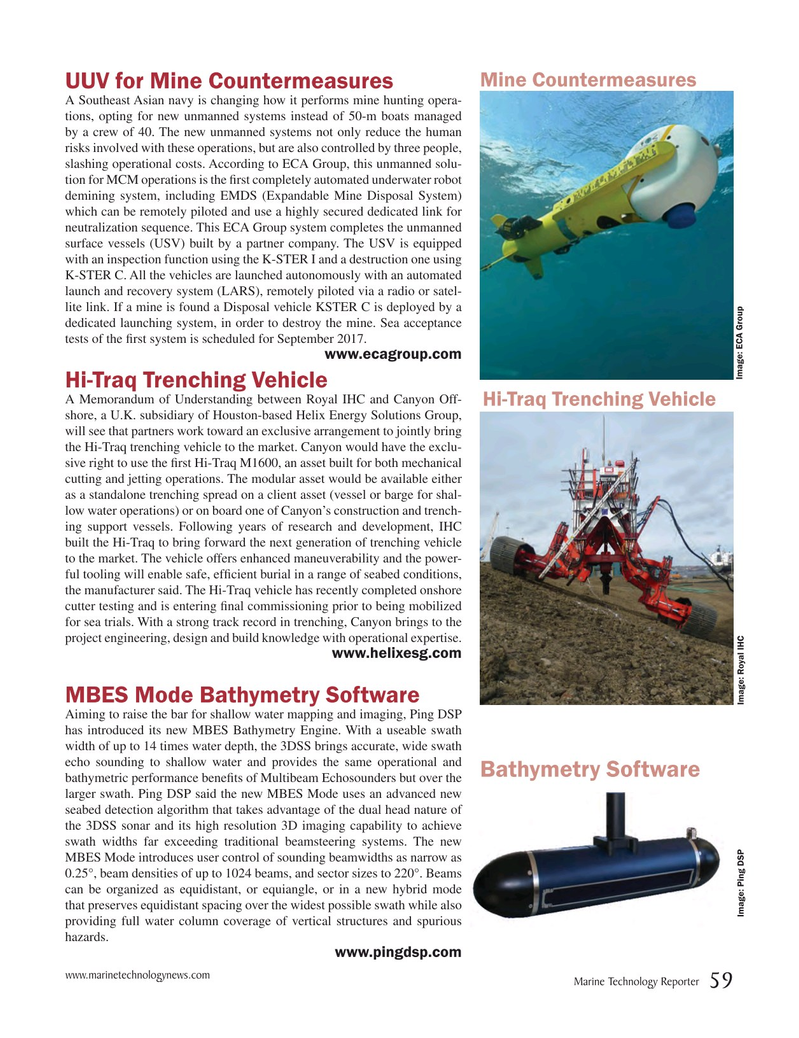
Page 59: of Marine Technology Magazine (October 2017)
AUV Operations
Read this page in Pdf, Flash or Html5 edition of October 2017 Marine Technology Magazine
Mine Countermeasures
UUV for Mine Countermeasures
A Southeast Asian navy is changing how it performs mine hunting opera- tions, opting for new unmanned systems instead of 50-m boats managed by a crew of 40. The new unmanned systems not only reduce the human risks involved with these operations, but are also controlled by three people, slashing operational costs. According to ECA Group, this unmanned solu- tion for MCM operations is the ? rst completely automated underwater robot demining system, including EMDS (Expandable Mine Disposal System) which can be remotely piloted and use a highly secured dedicated link for neutralization sequence. This ECA Group system completes the unmanned surface vessels (USV) built by a partner company. The USV is equipped with an inspection function using the K-STER I and a destruction one using
K-STER C. All the vehicles are launched autonomously with an automated launch and recovery system (LARS), remotely piloted via a radio or satel- lite link. If a mine is found a Disposal vehicle KSTER C is deployed by a dedicated launching system, in order to destroy the mine. Sea acceptance tests of the ? rst system is scheduled for September 2017.
www.ecagroup.com
Image: ECA Group
Hi-Traq Trenching Vehicle
A Memorandum of Understanding between Royal IHC and Canyon Off-
Hi-Traq Trenching Vehicle shore, a U.K. subsidiary of Houston-based Helix Energy Solutions Group, will see that partners work toward an exclusive arrangement to jointly bring the Hi-Traq trenching vehicle to the market. Canyon would have the exclu- sive right to use the ? rst Hi-Traq M1600, an asset built for both mechanical cutting and jetting operations. The modular asset would be available either as a standalone trenching spread on a client asset (vessel or barge for shal- low water operations) or on board one of Canyon’s construction and trench- ing support vessels. Following years of research and development, IHC built the Hi-Traq to bring forward the next generation of trenching vehicle to the market. The vehicle offers enhanced maneuverability and the power- ful tooling will enable safe, ef? cient burial in a range of seabed conditions, the manufacturer said. The Hi-Traq vehicle has recently completed onshore cutter testing and is entering ? nal commissioning prior to being mobilized for sea trials. With a strong track record in trenching, Canyon brings to the project engineering, design and build knowledge with operational expertise. www.helixesg.com
MBES Mode Bathymetry Software
Aiming to raise the bar for shallow water mapping and imaging, Ping DSP has introduced its new MBES Bathymetry Engine. With a useable swath width of up to 14 times water depth, the 3DSS brings accurate, wide swath echo sounding to shallow water and provides the same operational and
Bathymetry Software bathymetric performance bene? ts of Multibeam Echosounders but over the larger swath. Ping DSP said the new MBES Mode uses an advanced new seabed detection algorithm that takes advantage of the dual head nature of the 3DSS sonar and its high resolution 3D imaging capability to achieve swath widths far exceeding traditional beamsteering systems. The new
MBES Mode introduces user control of sounding beamwidths as narrow as 0.25°, beam densities of up to 1024 beams, and sector sizes to 220°. Beams can be organized as equidistant, or equiangle, or in a new hybrid mode that preserves equidistant spacing over the widest possible swath while also
Image: Ping DSP Image: Royal IHC providing full water column coverage of vertical structures and spurious hazards.
www.pingdsp.com www.marinetechnologynews.com
Marine Technology Reporter 59
MTR #8 (50-63).indd 59 MTR #8 (50-63).indd 59 9/28/2017 3:33:48 PM9/28/2017 3:33:48 PM

 58
58

 60
60
